Digital transformation is the hot buzzword of our time, and as we inch closer to 2025, it’s more important than ever to align your IT infrastructure to meet evolving demands. Businesses, especially in KSA, are investing heavily in transformation strategies. But here’s the thing: digital transformation is not just about deploying fancy tech—it’s about setting up the right foundation for scalability, resilience, and innovation.
Whether you’re a leader in financial services consulting companies or a tech-savvy entrepreneur, these six actionable tips will help you ace digital transformation in 2025 and beyond. Let’s dive in!
Modernize Legacy Systems Without Losing Your Mind
Legacy systems, often compared to the digital arteries of an organization, are increasingly becoming a bottleneck in the transformation journey. A 2024 Gartner report revealed that 76% of organizations in KSA admitted that outdated technology hampers their ability to innovate effectively. Furthermore, a PwC analysis found that businesses relying on legacy systems face an average of 30% higher operational costs due to inefficiencies and maintenance challenges.
Modernizing these systems is no longer optional; it’s a necessity for companies aiming to remain competitive. In KSA, over 60% of organizations plan to allocate significant portions of their IT budgets to legacy modernization by 2025, according to a recent IDC survey. Additionally, businesses that successfully transition away from legacy systems report up to a 40% improvement in operational efficiency within the first year of modernization.
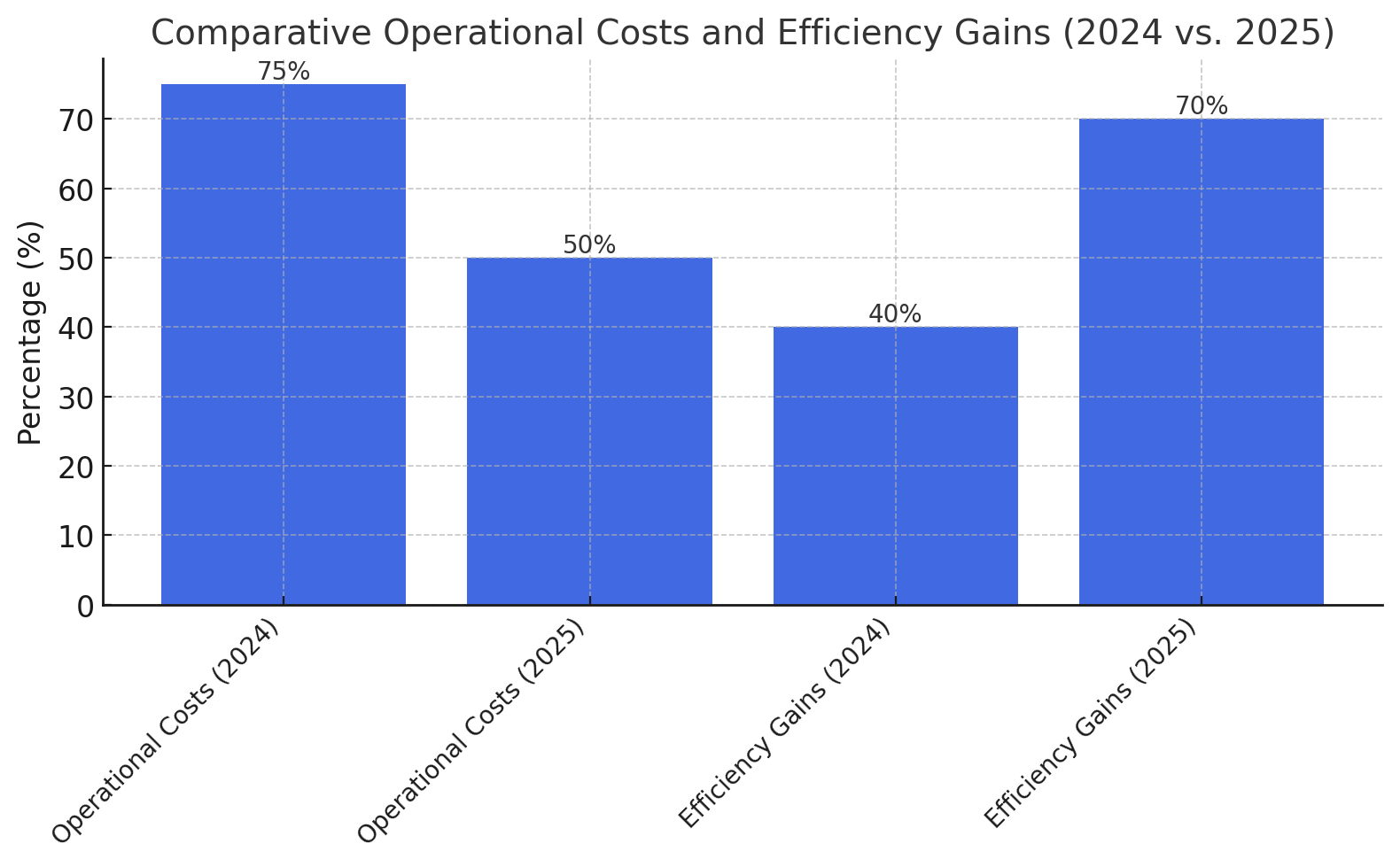
Chart Placeholder: The chart illustrates the comparative operational costs and efficiency gains of organizations before and after legacy system modernization (2024 vs. 2025 projections).
Hybrid strategies have emerged as a leading solution, allowing businesses to gradually phase out legacy systems while integrating advanced platforms. Middleware tools have proven to be invaluable in connecting outdated infrastructure with contemporary solutions, reducing downtime and ensuring smoother transitions. Notably, companies adopting hybrid models see a 25% reduction in system integration costs, as noted by a 2024 Forrester study.
Additionally, employee training plays a crucial role in ensuring the success of modernization projects. A study by Deloitte showed that companies investing in workforce upskilling reported a 45% faster adoption rate of new systems compared to those that did not prioritize training. Upskilling not only ensures smoother implementation but also empowers employees to maximize the capabilities of new systems.
How Insights KSA can help: Insights KSA has been pivotal in guiding businesses through these transitions. By designing tailored modernization strategies, they ensure minimal disruption while enabling organizations to align their infrastructure with cutting-edge digital transformation demands. With projected benefits including reduced operational costs, improved system performance, and faster cloud adoption, modernizing legacy systems is a foundational step toward achieving transformative growth in 2025.
Adopt a Cloud-First but Not Cloud-Only Approach
Cloud computing remains the backbone of IT innovation, and in KSA, its adoption is booming. IDC’s 2024 KSA IT Infrastructure Insights reported a 48% surge in cloud adoption last year, with hybrid and multi-cloud strategies emerging as key trends for 2025. Organizations are discovering that while a cloud-first approach enhances flexibility, scalability, and cost-efficiency, an over-reliance on cloud solutions exposes them to risks such as vendor lock-in, data sovereignty issues, and escalating costs.
The solution lies in adopting a balanced approach that leverages both cloud and on-premises systems. By implementing hybrid and multi-cloud models, businesses can distribute workloads across multiple providers, reducing dependency on any single platform. For example, in a 2024 Accenture study, 72% of KSA organizations cited reduced downtime and improved data accessibility as key benefits of hybrid strategies.
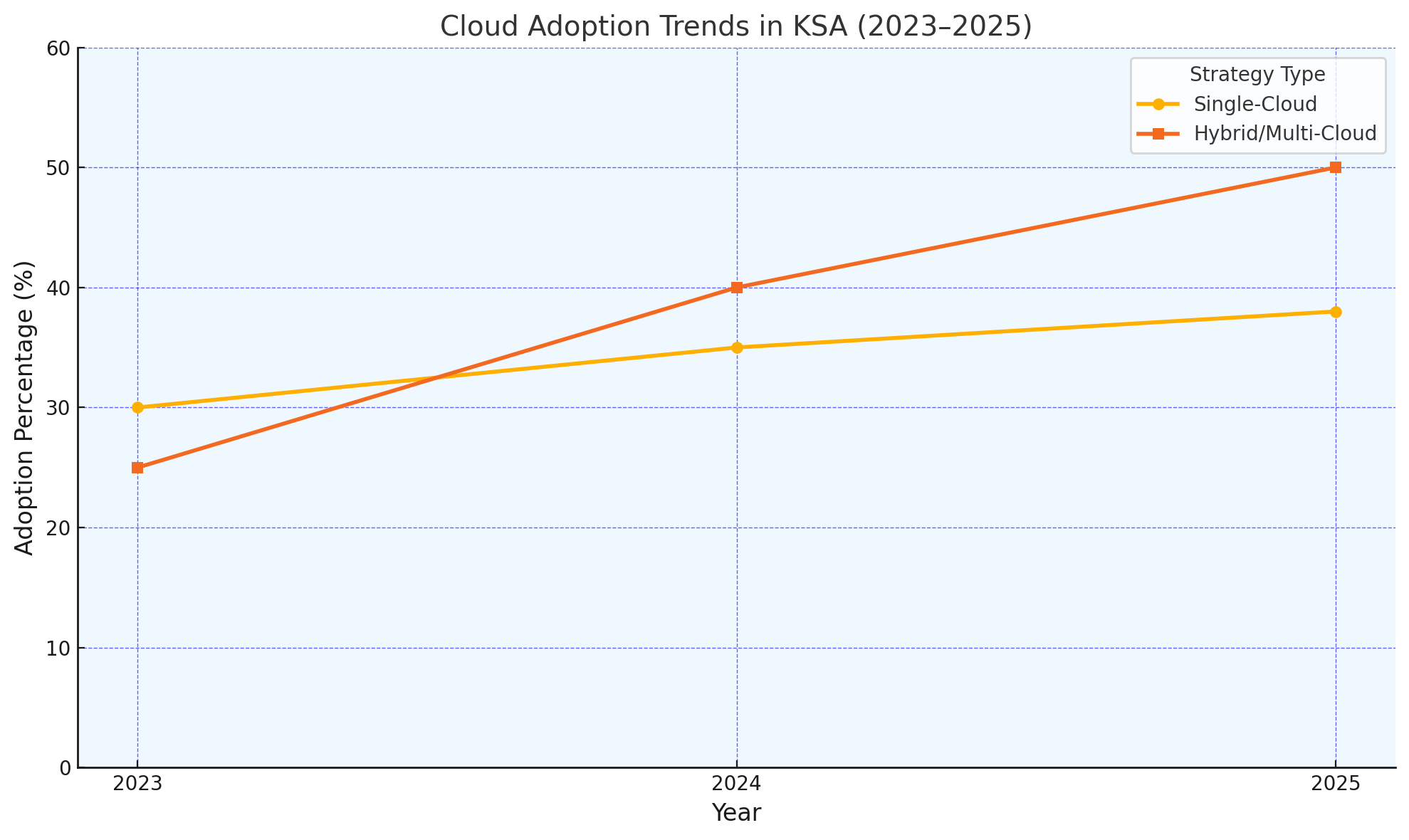
Chart Placeholder: It compares cloud adoption trends in KSA (2023–2025), segmented by industry and strategy type (single-cloud vs. hybrid/multi-cloud).
Data security and compliance remain significant considerations for KSA businesses, especially with regulations mandating local data storage. Hybrid solutions help organizations meet these compliance requirements by enabling sensitive data to be stored on-premises while leveraging cloud services for scalability.
Automated cloud management tools play a vital role in optimizing these systems. These tools monitor resource utilization, predict cost trends, and ensure seamless integration between providers. Research by Gartner in 2024 found that businesses using advanced cloud management tools saw a 20% reduction in operational costs and a 30% increase in resource utilization efficiency.
How Insights KSA can help: Insights KSA’s expertise lies in crafting cloud transformation roadmaps tailored for financial services consulting companies and other industries. They help businesses navigate complexities, optimize their cloud architecture, and ensure that hybrid systems align with their operational goals. By combining strategic insights with hands-on implementation, Insights KSA empowers organizations to maximize the potential of cloud solutions while maintaining control and flexibility.
Fortify Cybersecurity Like a Pro
The rapid pace of digital transformation has also led to a surge in cyber threats. In 2024, the average cost of a data breach in KSA climbed to SAR 20 million, representing a 25% increase from 2022. Financial services consulting companies and other industries handling sensitive data were particularly vulnerable, making robust cybersecurity strategies an indispensable part of digital transformation.
Zero-trust architecture has emerged as a transformative approach to security. This model assumes that threats exist both inside and outside the network, enforcing strict identity verification measures before granting access. Businesses in KSA adopting zero-trust models reported a 40% reduction in security breaches, according to a 2024 Cybersecurity Ventures study. This approach works in tandem with endpoint security measures and network segmentation to minimize potential vulnerabilities.
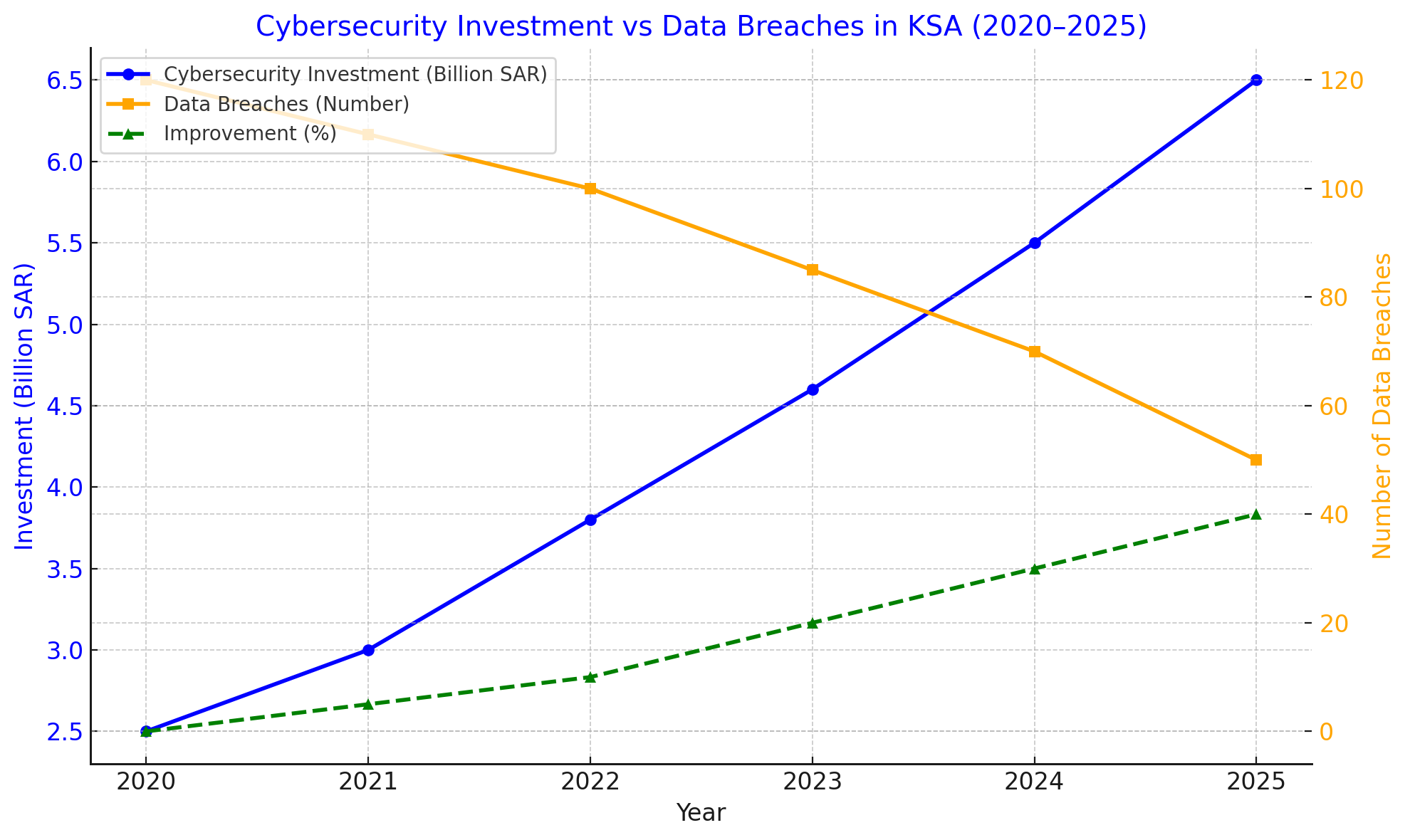
Chart Placeholder: The graph shows the increase in cybersecurity investment in KSA (2020–2025) alongside data breach statistics and percentage improvements from adopting advanced security measures.
The role of artificial intelligence (AI) in cybersecurity has also grown significantly. AI-driven systems can detect anomalies and predict potential threats in real-time, enabling faster response times. A McKinsey analysis from 2024 revealed that companies utilizing AI for cybersecurity reduced the average threat detection time from 280 days to 90 days, enhancing their ability to mitigate damage.
Moreover, regular penetration testing and red team exercises have proven effective in identifying weaknesses in infrastructure. In KSA, 58% of businesses conducting quarterly penetration tests experienced a 30% decrease in successful phishing attacks compared to those conducting annual or less frequent tests.
How Insights KSA can help: By staying ahead of evolving threats, Insights KSA ensures that businesses can pursue innovation without compromising safety.
Embrace Automation (Because Time is Money)
Automation is no longer just a competitive edge; it has become an operational necessity. In KSA, automation has transformed industries by streamlining workflows, reducing errors, and increasing efficiency. McKinsey’s 2024 analysis revealed that organizations adopting automation in their operations reported an average 35% boost in productivity. Moreover, automation initiatives saved KSA companies approximately SAR 5 million annually by minimizing manual inefficiencies and accelerating decision-making.
Key sectors in KSA, including manufacturing, financial services, and logistics, have embraced AI-driven automation tools. For instance, robotic process automation (RPA) has reduced processing times in financial services by up to 50%, while predictive maintenance powered by AI has lowered equipment downtime in manufacturing by 30%.
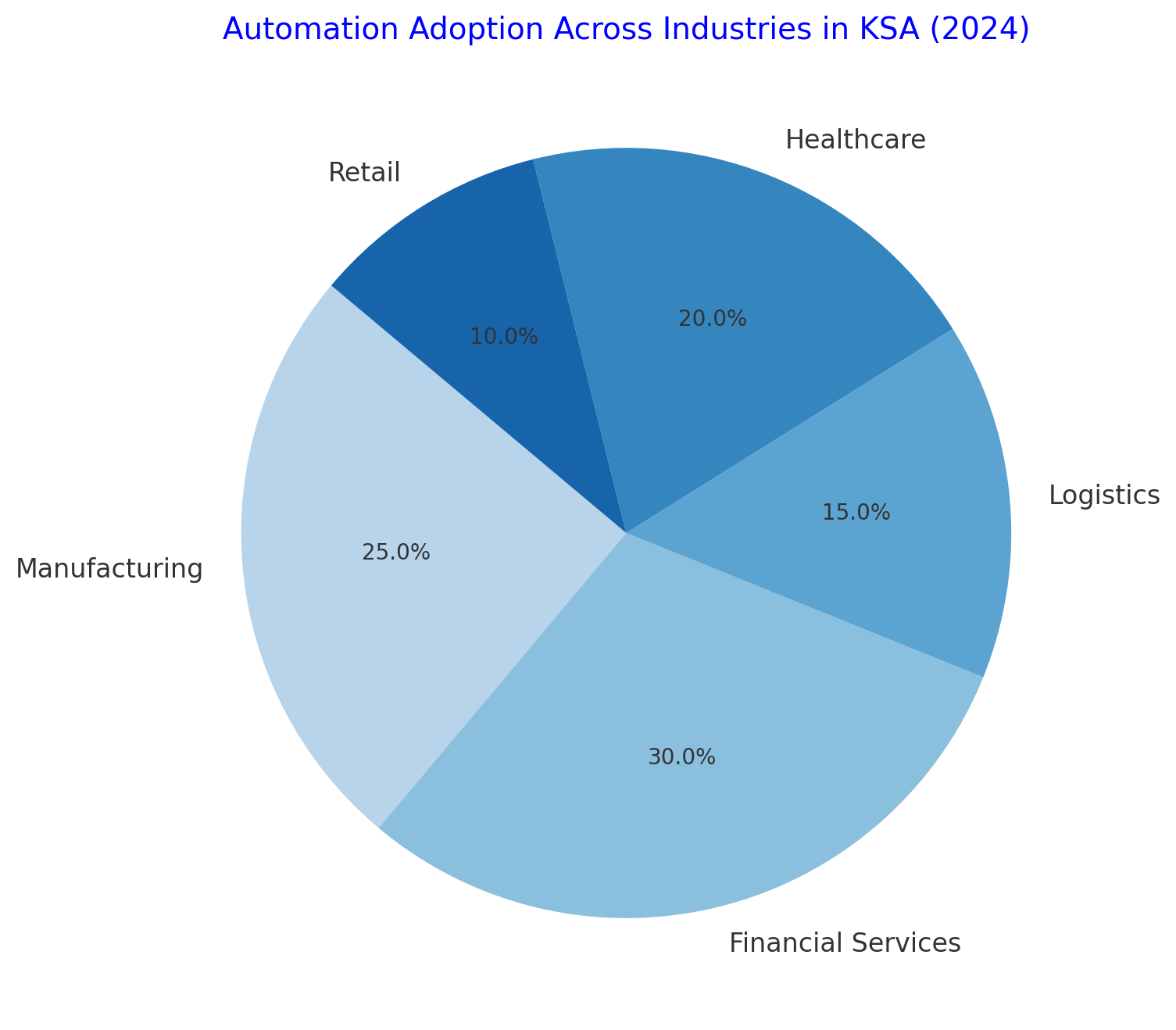
Chart Placeholder: Showcasing automation adoption across industries in KSA (2024) and its associated efficiency improvements.
Adopting IT operations automation (AIOps) has also become a game-changer. Businesses using AIOps in KSA have reported an average 40% reduction in system outages by leveraging real-time analytics and automated incident responses. By identifying patterns and anomalies, these tools proactively address potential issues, ensuring business continuity.
Automation isn’t just about tools; it’s also about implementation. A Bain & Company study found that companies employing phased automation strategies achieved faster ROI compared to those pursuing large-scale, immediate implementations. By targeting high-impact processes first, businesses can maximize their automation investments.
Invest in Edge Computing for Real-Time Insights
Edge computing has emerged as a cornerstone of modern IT strategies in KSA, particularly with the country’s Vision 2030 emphasizing IoT, smart cities, and enhanced customer experiences. By processing data closer to its source, edge computing minimizes latency, improves decision-making speed, and ensures high reliability. A report by Deloitte projects a 60% increase in edge computing investments in KSA by 2025, with sectors like healthcare, retail, and manufacturing leading the charge.
In healthcare, for instance, edge computing enables real-time patient monitoring and rapid diagnostics, significantly enhancing care quality. Similarly, the retail industry benefits from personalized customer experiences powered by instantaneous data analysis, such as dynamic pricing and inventory management. In manufacturing, edge systems optimize production lines by reducing downtime and enhancing predictive maintenance capabilities—a strategy that has been shown to improve efficiency by up to 30%.
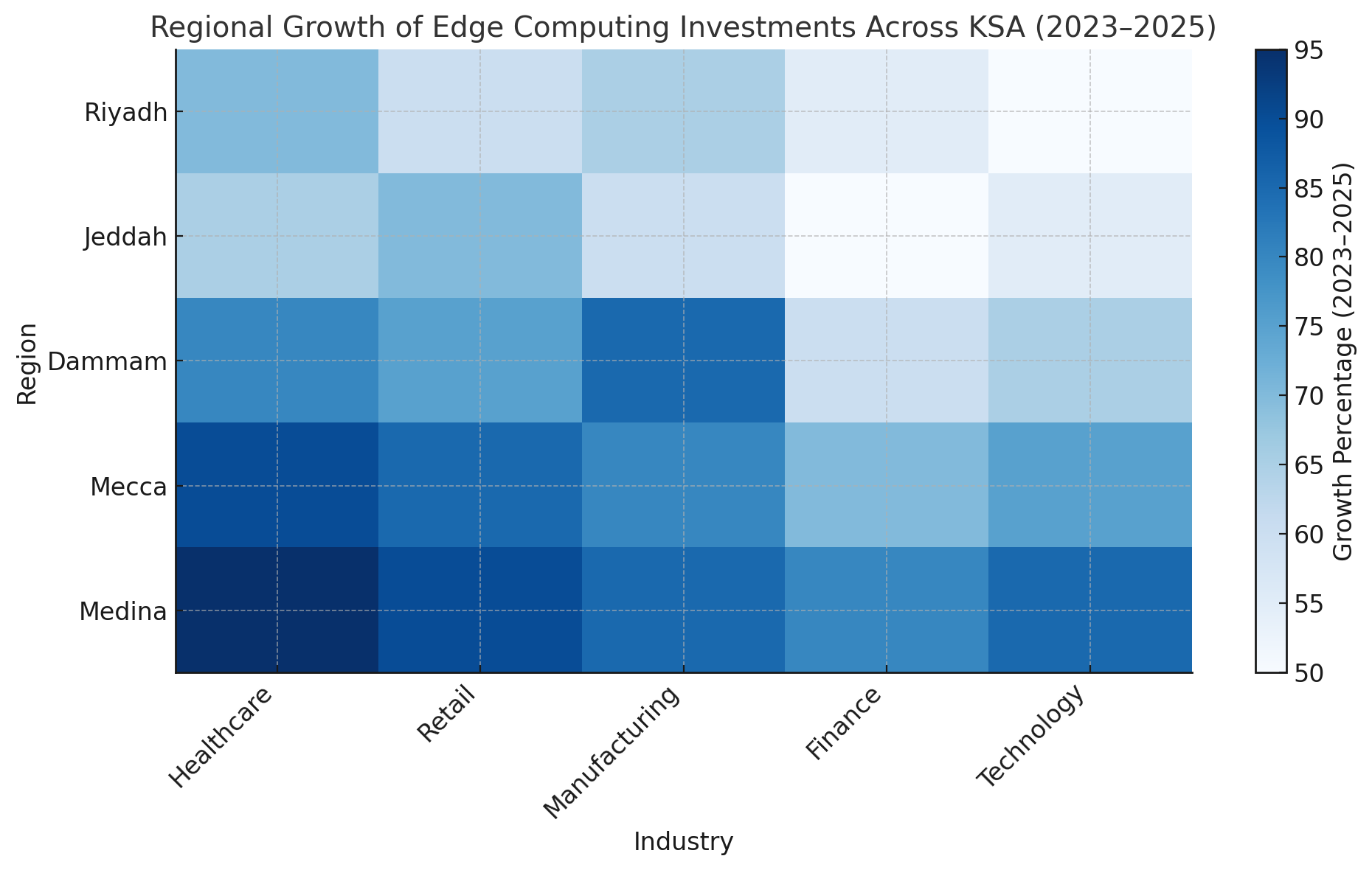
Chart Placeholder: Heatmap illustrating the regional growth of edge computing investments across KSA (2023–2025), segmented by industry.
The rise of edge computing is also intertwined with the growth of 5G networks in KSA. With 5G adoption expected to surpass 70% by 2025, businesses are leveraging this technology to power edge devices, ensuring seamless connectivity and faster data transmission.
Integrating edge computing with cloud systems remains a challenge but also a critical opportunity. Hybrid models—where edge systems handle real-time operations while cloud systems manage long-term analytics—are becoming increasingly popular. Research from IDC revealed that 55% of KSA companies employing hybrid edge-cloud solutions reported a 25% improvement in operational efficiency.
How Insights KSA can help: Insights KSA stands at the forefront of this technological shift, offering tailored edge computing solutions designed to meet the unique demands of the KSA market. From architecture design to seamless integration with existing IT systems, they enable businesses to harness the power of edge computing for real-time insights and competitive advantage.
Prioritize Sustainability Without Sacrificing Performance
Sustainability is no longer just a corporate social responsibility checkbox; it’s a critical business driver. With Vision 2030 steering KSA toward a greener future, organizations must align their IT infrastructure with sustainability goals. Investing in energy-efficient data centers and renewable-powered systems not only reduces carbon footprints but also lowers operational costs.
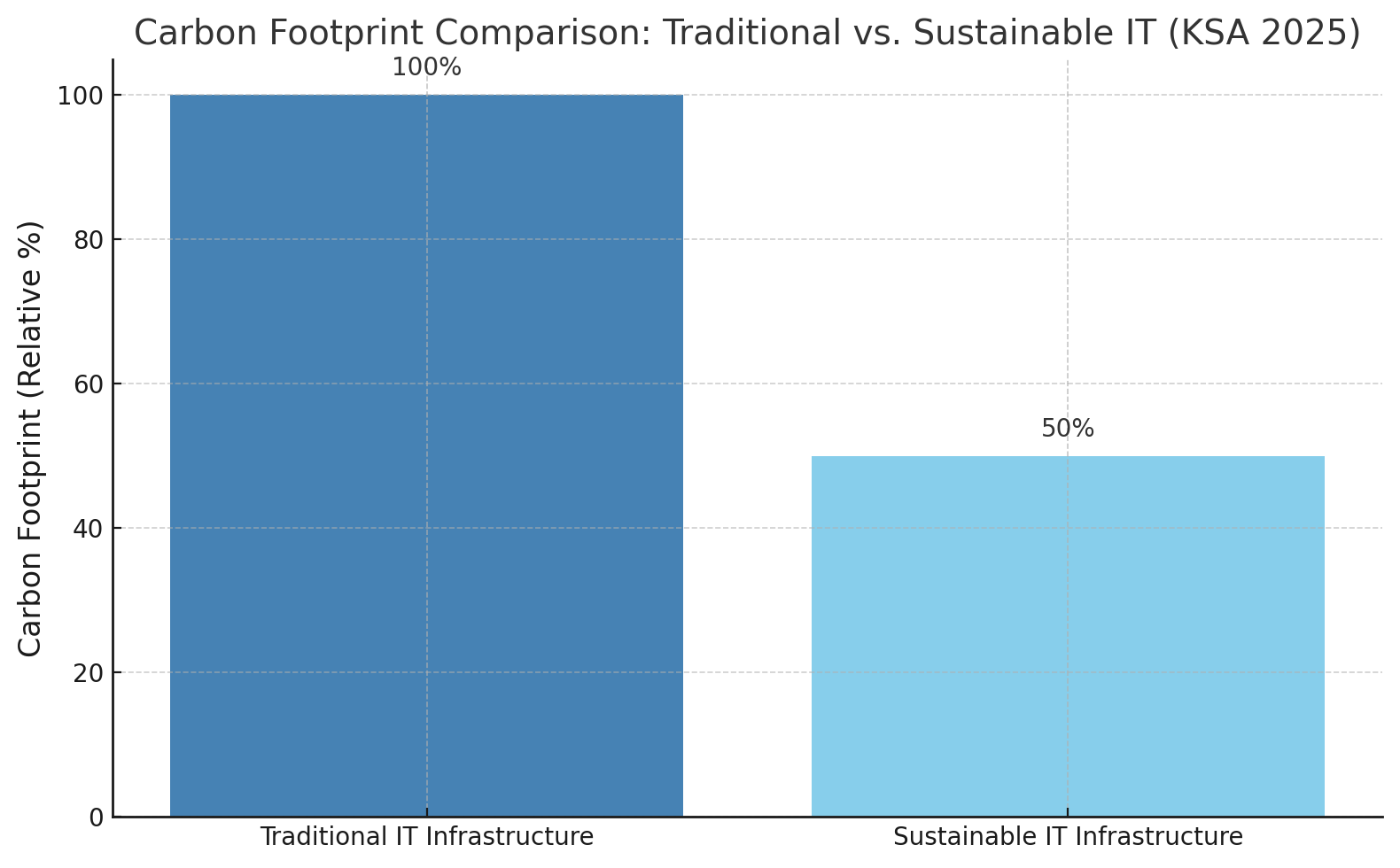
Chart Placeholder: Infographic comparing carbon footprints of traditional vs. sustainable IT infrastructures in KSA (2025 projections).
Sustainable IT practices extend beyond infrastructure. Recycling e-waste, optimizing energy usage with IoT-enabled systems, and adopting circular economy principles are pivotal in creating an eco-friendly IT ecosystem. Additionally, compliance with global sustainability standards enhances brand reputation and customer trust.
How Insights KSA can help: Insights KSA’s green IT solutions empower businesses to achieve their sustainability targets without compromising performance. By leveraging innovative technologies and providing actionable insights, they help organizations align with KSA’s Vision 2030 while ensuring long-term ROI.
The Takeaway: Digital Transformation Isn’t Optional
Digital transformation companies are at the forefront of change, but success hinges on robust IT infrastructure. For businesses in KSA, staying ahead means adopting these strategies to ensure resilience, scalability, and innovation.
How Insights KSA can Help You in this Situation: From legacy system modernization to cutting-edge automation, Insights KSA partners with businesses to navigate the complex digital transformation landscape. As a trusted name among financial services consulting companies, we deliver insights-driven solutions tailored to your unique needs. We are your ultimate guide in achieving success in digital transformation.
So, are you ready to transform? Let’s make 2025 your most transformative year yet!






